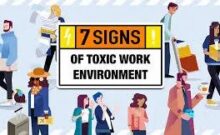
In our last post, I talked about how to know if your organization is toxic. You may have realized, “CRAP! My organization is toxic. It’s not just me!”
Well, now what?
You might be thinking, It’s just work. I can deal with it for eight hours, then come home and relax. But in reality, the emotional weight of a toxic workplace can carry over into your personal life if it isn’t properly addressed.
Increased stress and anxiety, trouble sleeping, burnout at work, depression, over- or under-eating…in a toxic environment, it’s not uncommon to exhibit any or all of these symptoms.
Since it takes time to find a new job and you can’t just walk away from this difficult situation immediately, it helps to develop ways to handle the dysfunction until you can step into a new job somewhere else.
You have the right to work in a safe environment. Employees, usually women, are often told to temper their emotions in the workplace. But when you add in toxic environments and bullying, it can wreak havoc on your emotions – and that’s not something to ignore. While women in particular may have concerns about being perceived as weak or overly sensitive, it is important to realize that you DON’T have to buy into the myth that you need to just “toughen up” and accept your circumstances.
Find out if your organization has a policy on workplace conduct. It is worth checking your employee handbook and other documents that outline the organization’s values. Talk with HR and/or your manager if you can.
Address the unacceptable behavior. It’s possible that the person creating the toxic conditions isn’t aware of what they are doing. You can try making the person aware of their actions and why it’s a problem. Generally, you want to address specific issues as soon as they occur to ensure that everyone still remembers what happened. You can set up a one-on-one meeting with that individual or simply pull them aside to calmly explain why their actions are inappropriate. Keep the interaction as direct and non-confrontational as possible. Use “I” language instead of “you” language. If this isn’t possible, you can also take the issues that you see to HR or another employee engagement department within your organization. There may be informal resources available for mediation or other constructive solutions that don’t put you in the direct spotlight.
Find an ally. In some toxic offices, you can’t trust your coworkers. It sounds almost primitive, but especially in toxic environments, gossip flies, favoritism reigns, and you may not be sure what you can safely say. It’s more than likely, however, that you aren’t the only one feeling the way you do. Find people you can trust, with whom you can vent, who can sympathize with you, and who can keep an eye on your back as well.
Take care of yourself. Do things that can help relieve the stress. Take a walk. Talk with friends. Play with your kids or pets. When we’re through COVID-19, go to the gym, get a massage, or take a yoga class. Paint. Draw. Sing. Dance. Take a class to learn how to do any of these things. Read a book. Write a book. Live a full life outside the office.
Document everything. Save emails, texts, IMs, and other kinds of correspondences. Write down comments and decisions from meetings, phone calls, and every person who interacts with you. Although you may think you won’t forget what happened, it’s difficult to retain the details of what occurs over time. The more details, the better. If you need to file a complaint, you will need the evidence to back your claim – and the process of writing it out may help you to see things you might not otherwise see. It can also be cathartic.

Create an exit strategy. Leaving a job is rough, especially since you’ve probably made friendships and have become used to the routine – not to mention having to go through the job search process again. It’s possible that things might get better at your job, in which case it might make sense to stay. However, while waiting it out, begin your search for a new job. This will help you stay positive when things get rough. And if the situation is taking a real toll on your life, both professionally and personally, then make a plan to start putting your resume out there. If you needed to leave yesterday, consider a bridge job that will keep you active while you find something in line with your career.
When a toxic workplace becomes a legal issue: Not all toxic workplaces are unlawful, but some practices that contribute to the environment can absolutely violate the law.
Your workplace may be in violation of the law if…
1. There is discrimination based on gender, age, race, religion, sexual orientation, parental status, or disability
2. Employees are sexually harassed
3. The company fails to heed and address allegations of discrimination or sexual harassment
If the issues you’re facing in the workplace meet any of these standards, document in detail what you have experienced and bring the issues to the attention of your supervisor or the HR department. If the company fails to address the issue, you can contact the Equal Employment Opportunity Commission (EEOC), which can provide legal guidance.
I hope this has been helpful. Our website JandJCG.com also has a cultural health assessment that you can take if you want more insights into how your organization stacks up. If you’re in an organization with a culture that is toxic – or even just not great – you want to begin to think about how you can transform it. If it can’t be transformed, I encourage you to get serious about your exit strategy.
Again, you DO deserve to be in an organization where people want to work, with folks who are engaged and people are loyal. We all do.






